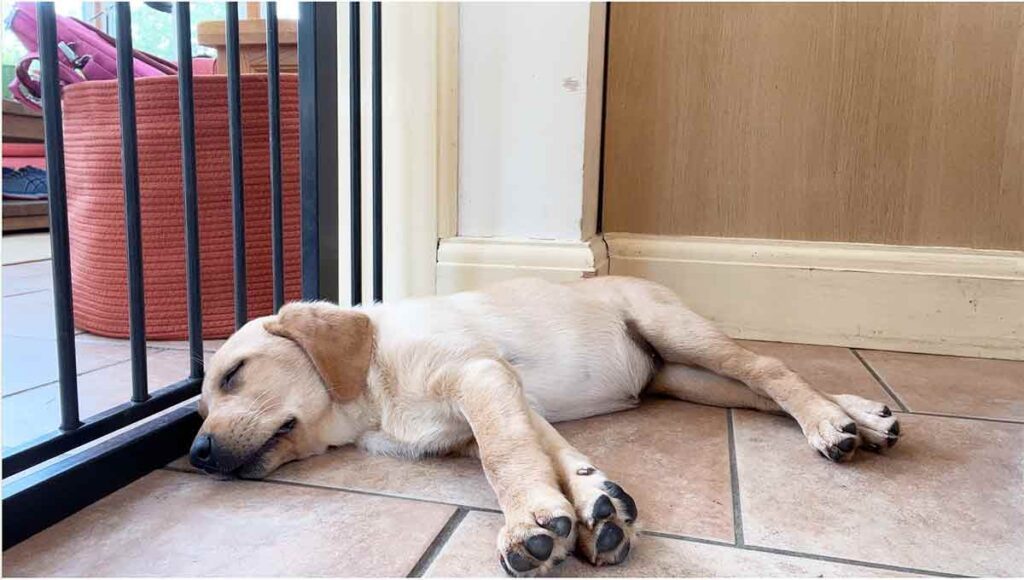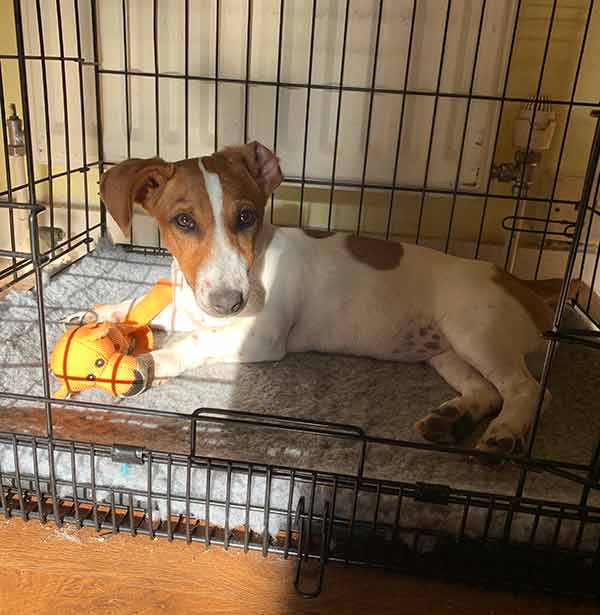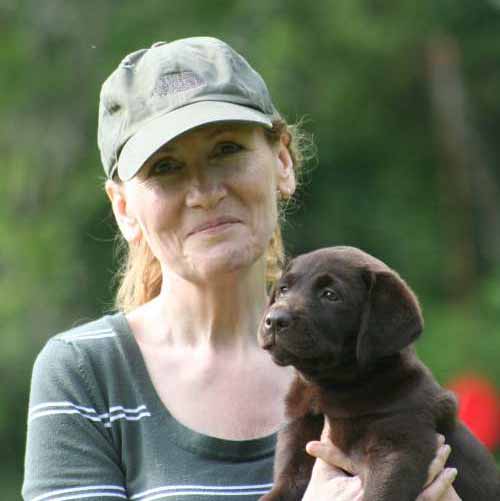So often, when people tell me they are having problems with a new puppy, it’s because they do not have a clearly defined puppy zone.

What is a puppy zone?
A puppy zone is a room or large space in your house that your puppy is restricted to for the majority of the day. It will have washable floors. And be in a busy family part of your home. Somewhere that people congregate, to eat, chat and relax.
The simplest way to keep the puppy in their zone is by using baby gates in doorways. If you have an open plan home then you may need to buy a large puppy playpen or room divider to restrict your puppy to their zone
What is a puppy zone for?
The purpose of the puppy zone is not to confine the puppy there all the time. It’s to give your puppy a safe space to rest and play, and to give you some peace of mind when you are busy.
You’ll be able to relax in the knowledge that your puppy isn’t pooping on your bedside rug or falling out of an upstairs window, or teasing the cat, or chewing up your son’s new sneakers, while you struggle to get kids ready for school or prepare supper.
Of course you can always take your puppy with you to different parts of your house, but when you do this, you need to supervise even more closely.
Can’t I just use a crate?
Used appropriately, crates are a great training tool, and a good place for a crate confident dog to spend short periods of time, or to sleep at night. But they do not make great puppy zones

Most new puppies are not accustomed to being crated and may become distressed if shut in a crate. You can, and should, teach your puppy to love their crate but that can take a week or two, and meanwhile you need somewhere safe for your puppy to be when you are busy.
If your puppy has a pee or poop accident in a puppy zone that’s unfortunate but it can easily be wiped up and no harm done.
If your puppy has an accident in their crate, in other words in their bed, you have a problem. Not only will the puppy be upset, but if this happens more than once you may lose your greatest potty training asset.
That asset is the fact that all puppies will try very hard never to pee in their bed. Unfortunately the instinctive urge to keep their bed clean disappears quite quickly if a puppy is shut in a crate until forced to empty their bladder in there. And that can lead to long term bed wetting and soiling problems.
You really do not want to go there.
The other problem with crates is that the puppy cannot interact with anyone while they are inside. That may be a useful attribute at times, if a puppy is overstimulated and needs to calm down for example. But it’s not a good thing in the long term. Read more about the use (and misuse) of crates.
Your puppy needs to be able to interact with people and learn about how life works in your home. And they can’t do that in a crate.
So while I recommend you get a crate for your puppy. You will also need a puppy zone in your home. Here are some of the attributes your puppy zone will need.
Washable floors
The easy to wash floor is vital. Small puppies like to pee on soft surfaces, and anywhere where they can smell pee.
The problem with carpets, especially dark colored or patterned carpets, is that not only are they hard to clean, it’s really hard to spot accidents. And if you miss a puddle, and don’t clean it up properly, it’s not a question of if the puppy will pee there again, its just a question of when.
Make it safe
Any loose wires or cables in a puppy zone will need to be moved or covered. Puppies have no understanding of electricity and love to chew on plastic and wire.
They also enjoy chewing furniture legs, baseboards and even walls. I’ll give you some tips in the next day or two for toys that can help reduce this kind of damage. But you do have to accept that there may be some minor repairs needed when your puppy is through the chewing stage.
Keep it tidy
When a puppy moves in, its a good idea to move your nice stuff out of their puppy zone, and keep the floor as tidy as possible. Precious furniture needs to find a new temporary home and family members need to be told that they must pick up their shoes and other paraphernalia.
Make it clear that anything in the puppy zone is fair game for the puppy, otherwise you’ll be run ragged trying to pick up other people’s things before the puppy destroys them.
Heart of the home
A common puppy zone mistake is to set them up where there is not much human activity. In bathrooms, utility rooms, or out of the way back porches.
If you do this, one of two things will happen. Either the puppy will eventually get neglected and forgotten and quite likely develop a howling or whining habit. Or you will keep them out of the puppy zone for too long and potentially end up with potty problems or destructive behavior. So the puppy zone really does need to be in the heart of your home. A busy area where family often gather.
The kitchen is usually ideal. But a family room that is tiled or wood floored can also work
Easy access to outdoors
Another important feature of a puppy zone is that it has easy access to the outside space where you want your puppy to pee and poop. At the same time, it’s important that there is no direct access from this door, to any hazards such as traffic.
When we have new puppies at home we use puppy playpen panels to form an outdoor pen around the back door that leads into our kitchen. This means that we can quickly let a puppy out when they need to go. And we can safely take our eyes off the puppy for a moment if we need to.
If you are able to attach a couple of eyelet screws to the wall either side of your back door, so much the better. Puppy panels are held together with ‘drop in’ metal rods and you can drop the rod attached to the end panels through these eyes for a nice secure fit.
When you have an outdoor space that extends your puppy zone into your back yard, your puppy will enjoy spending time out there when the weather is warm, and potty training will be easier for you too.
Puppy zones reduce conflict and make life with a puppy easier and more relaxing. As your puppy grows and matures they’ll spend more and more time out of the zone, until one day you’ll realise you don’t need those baby gates any more.
Let us know if you have any questions about setting up a puppy zone. You can join our support group on Facebook. It’s free!
Look forward to meeting you there!

Free Training Tips
Get Pippa's free dog training tips delivered to your inbox

 Our Favorite Puppy Names!
Our Favorite Puppy Names!
When my puppy is in his playpen with a bed, toys , water, dry food and toys he just cry’s if he doesent see anything of us. How can I make him stop?
Hi Gale, it sounds like your pup needs some practice at learning to be alone. Start with whatever amount of time he can wait without crying, even if that’s just a few seconds, and then build up times gradually. The aim is to always get back to him before he starts to cry. Do pop over and see us in the Dogsnet Training support group if you’d like some more help with this 🙂